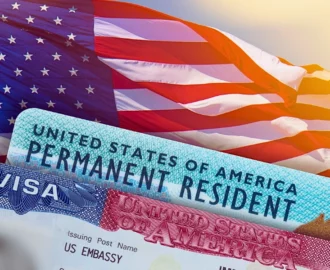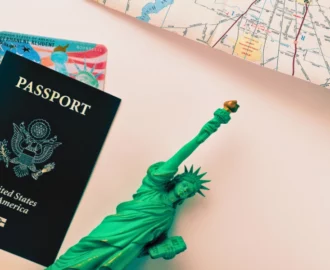Depending on the nature of your entry into the US, there are multiple nonimmigrant and immigrant visa categories to consider during the application process. Choosing the right visa is crucial to ensure you’re legally able to enter the country.

If you need help determining the right visa category for you and completing the visa application process, consult with the attorneys at Cho Immigration Law by calling 312-853-3088.
Which Visa Is Right for You?
There are many U.S. visa categories available, depending on the purpose of your visit and the type of sponsor you need to help with your application.
Nonimmigrant Visa Categories
If you’re entering the country temporarily, there are several nonimmigrant visa categories that allow you to gain employment or visit the U.S. for other purposes.
Nonimmigrant visa categories include:
- H Visas: These include H-1B, H-2A, H-2B, and H-3 visas. H-1B visas are for professionals and experts who receive a job offer in the country that demands their specialized skills. Meanwhile, H-2A visas are for temporary employees in agriculture, and H-2B visas are for temporary non-agricultural workers. H-3 visas, on the other hand, go to individuals who want to receive training in the U.S. outside graduate training or medical school.
- I Visas: These visas apply to members of foreign press, such as journalist, reporters, and camerapeople, working for a media outlet in another country.
- O Visas: Nonimmigrant visitors to the U.S. can apply for these visas if they have achievements or abilities that qualify as extraordinary and exceptional, along with people traveling with them.
- L Visas: If you’re changing positions within your current organization, you may apply for an L visa, such as a one-year L-1B visa for executives and managers or a three-year L-1A visa for individuals with certain specialized expertise.
- P Visas: Artists, athletes, and performance artists may enter the country on a P visa for events or a limited period of time, along with people accompanying them.
- R Visas: Individuals working in non-profit religious organizations may enter the country on an R visa to complete work directly associated with these organizations.
F visas are also available to students who want to continue their education in the U.S., such as exchange visitors who may need to temporarily live in the country while receiving their education. However, students on F visas won’t be able to gain work outside their educational institutions, and restrictions will apply to on-campus employment.
Another nonimmigrant visa option is a Trade North American Free Trade Agreement (TN NAFTA) permit, also known as a TN visa, that allows individuals from Mexico or Canada to work in the U.S. in accordance with the NAFTA agreement.
Immigrant Visa Categories
In addition to nonimmigrant visas, there are several types of visas for immigrants to apply for if they wish to work and live in the U.S.
For example, spouses of U.S. citizens may apply for IR1, CR1, or K-3 visas, depending on the applicant’s needs. While IR1 and CR1 visas allow nonimmigrants to apply for an immigrant visa to enter the country, they will need to await the approval of Form I-130, Petition for Alien Relative. A K-3 visa will enable spouses of American citizens to legally enter the country as nonimmigrants while they wait for the approval of their I-130 application, which can connect them with their loved ones sooner.
If you aren’t currently married, but are engaged to an American citizen and want to live and work in the U.S., you could also apply for the K-1 fiancé(e) visa.
Individuals may want to move to the U.S. primarily for employment purposes, in which cases they can apply for employment-based immigrant visas. These include EB1 visas, which are reserved for priority workers, E2 visas for professionals with exceptional abilities or advanced degrees, and E3 visas for other types of employees across a range of industries. In these instances, employers would be responsible for sponsoring prospective employees while they apply for immigrant status.
Additionally, there are immigrant U.S. visa categories available for religious workers, Iraqis or Afghans who worked with the American government, translators or interpreters from Iraq or Afghanistan, and other immigrants seeking legal residency or employment in the U.S.
Are There Special U.S. Visa Categories?
The Special Immigrant Visa program allows immigrants to live permanently in the U.S. if they provided aid to the U.S. government.
This visa type started in 1965 as a means of allowing more qualifying immigrants into the country who meet the criteria. For instance, special immigrant visa applicants must be either lawful permanent residents (LPRs) returning from another country, immigrants who served as ministers with applicable religious organizations in the U.S., or Panamanian nationals at risk due to the Panama Canal Treaty.
In recent years, the government has issued more SIVs to help Afghan and Iraqi refugees. If you are an Afghan or Iraqi translator or another worker who assisted the U.S. government, or if your life is at risk because of your association with U.S. government work, you may be able to apply for an SIV.
How to Prepare for the Visa Application Process
Regardless of the type of visa you ultimately decide to apply for, you will need to go through a strict visa application process before you can receive your visa. A mistake along the way could lead to the U.S. Citizenship and Immigration Services (USCIS) rejecting your application.
The following are ways you can prepare for the application process to keep it smooth and increase your chances of success:
Make Sure Your Passport Is Valid
One of the most important pieces of documentation you’ll need during the visa application process is your passport. This passport must be valid and contain all accurate, up-to-date information. It must also be valid for a minimum of six months following your period of stay in the country, with exceptions.
Gather Supporting Documents
You will need other documentation to support your application, with immigrant visa applications requiring more documentation than nonimmigrant visas.
You will need the following documents to support your nonimmigrant visa application:
- DS-160 confirmation page
- A 2″x2” photo of you against a white background that’s no more than six months old at the time of applying
- I-797 approval notice for R, L, and H visa applicants
- I20 or DS-2019 and fees for J, M, and F visa applicants
Depending on the circumstances of your visit and the desired U.S. visa category, you may also need to provide other types of documentation, such as details about the nature of your trip to the U.S., your ability to cover the expenses of the trip, and proof of your intent to leave the U.S. after your period of stay.
Prepare for Your Interview
Another critical step you must take is an interview with a USCIS officer. To succeed with your interview, you should schedule and complete the necessary medical examination, know the visa program you’re applying for, and know what types of questions the interviewer will likely ask about you.
You should also ensure you have all necessary supporting documentation to help you during your interview.
How an Immigration Attorney Can Help You Pick the Right Visa
The visa application process can be daunting, regardless of whether you’re applying for immigrant or nonimmigrant U.S. visa categories. If you need help identifying the right visa for you and completing the application process, experienced immigration legal services attorneys in Chicago can help.
Lawyers can help you understand the four types of immigration statuses in the U.S. and connect you with the right visa based on your desired status. Additionally, they can provide information about the different types of visas and what you’ll need to qualify for them, such as the differences between a fiancé visa vs. spouse visa.
Not only can they help you pinpoint the right US visa categories, but they can also assist you before and during the application process. They can start by helping prepare all documentation you’ll need based on your visa category, complete the application with all relevant, accurate information, and keep track of your application’s process as it awaits USCIS approval.
Chicago immigration attorneys may also provide representation if you face immigration issues such as removal and deportation, helping to keep you in the country.
If you would like help from a dependable immigration lawyer in Chicago, call Cho Immigration Law at 312-853-3088 for assistance with your case.




